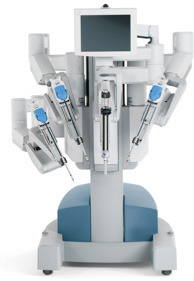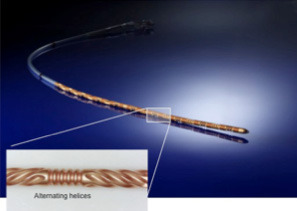Co-Directors
-
Andrew Barleben, MD, Assistant Clinical Professor, Surgery
-
Frank E. Talke, Ph.D., Professor, Mechanical & Aerospace Engineering
- James Friend, Ph.D., Professor, Mechanical & Aerospace Engineering
Research
The mission of the Center for Medical Device Engineering and Biomechanics (CMDEB) is to achieve interdisciplinary innovation to design personalized, intelligent biodevices, especially microdevices. These engineered microdevices will revolutionize current medical protocols and play a central role in bringing about a decentralized paradigm shift for the benefits of patients and the nation as a whole.

Robot Surgery
The principal aims of the CMDEB are to 1) foster synergistic collaborations in the area of medical devices and instrumentation among faculty members currently in various departments in the School of Medicine and the Jacobs School of Engineering, 2) facilitate the incubation of novel concepts and ideas and to catalyze the technology transfer and commercialization of UCSD inventions in the area of medical devices, 3) establish strategic partnerships with the industrial sector for the development of novel ideas and concepts in medical devices and instrumentation, and 4) satisfy the currently unmet demand for the education of students and the continuous training of scientists and engineers in the growing medical devices industry.
The CMDEB will perform key fundamental research to enable new technology and to translate these basic discoveries into tangible, innovative designs with the close participation of industrial partners. The main innovation of our approach is to develop novel control strategies with smart, dynamically interfaced on-body biosensors and actuators that can control drug release, electrical stimulation and other therapeutic outputs by means of a combination of intelligent feedback and global wireless interconnectivity. These systems will be matched to specific physiological and metabolic sensors embedded in networks of newly designed biodevices for the intelligent management of chronic diseases.
The CMDEB will drive the technology revolution through transformative engineering research to overcome fundamental technological gaps not only in the design of sensors and drug delivery systems, but also in the implementation of feedback control for intelligent decision-making and autonomous treatment of medical conditions. Recent advances in biocompatible materials, embedded signal processors, design and control of micro-electro-mechanical and nano-scale devices, wireless communications, and large-scale computing, together with new developments in neurosciences, physiology, and other basic sciences, have created an unprecedented opportunity to make these autonomous engineered devices a reality.
In addition, the CMDEBT will develop computer-assisted, real-time control of interventional surgical devices; robotics, artificial intelligence, smart algorithms, and/or expert systems for image-guided interventions; steerable devices including catheters, endoscopes and needles; micro-fabrication of instrumentation for in vivo tissue analysis and image-guided treatments; and mathematical and computer models to aid diagnosis and treatment decision- making.

Intravascular catheter
for hypothermic surgery
The Center has defined seven thrust areas: Metabolic Biosensors; Drug Delivery Systems; Neural Interfaces and Integrated Physiological Instrumentation; Control of Implantable and Wearable Biodevices; Biomaterials; Power Autonomy, Data Accessibility, and Interconnectivity; and System Integration and Embedded Life Sciences Applications.
The Center has established academic and industrial partnerships nationally and internationally (including Germany, Spain, Taiwan, UK and other countries). The industrial partners include Medtronic, Boston Scientific, Glysens, NeuroVigil, and several other companies. An inter-institutional consortium has been assembled to focus on a wide range of personalized microdevices to treat important chronic conditions, including neurological diseases such as Parkinson’s disease, epilepsy, obesity, diabetes and other metabolic diseases. A systematic engineered approach integrating a large number of enabling technologies will be used to design and fabricate the innovative intelligent biodevices needed to manage these chronic diseases.
CMDEB Members
View all researchers affiliated with CMDEB here.


